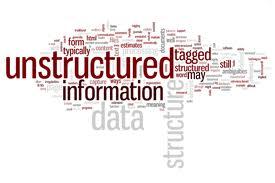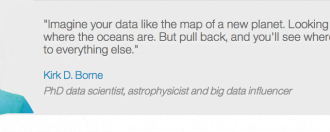
‘Tis the season to be jolly – and to be generous with your data. So says Global Pulse, the United Nations initiative on big data. As a network of innovation labs, the UN’s Global Pulse campaigns for data philanthropy. What does this mean and how can your business adopt a spirit of giving when it comes to data?

‘Tis the season to be jolly – and to be generous with your data. So says Global Pulse, the United Nations initiative on big data. As a network of innovation labs, the UN’s Global Pulse campaigns for data philanthropy. What does this mean and how can your business adopt a spirit of giving when it comes to data?
Data philanthropy is an initiative that advocates the sharing of data collected by enterprises, so that the public can benefit, and stems from the notion that shared data is a public good and can be used to create a positive impact for public policy decisions and academic research.
At the heart of this initiative are two fundamental ideas. Firstly, much of this data comes from consumers and customers as they go about their lives, using their mobile phones, networking via social media, and visiting web sites. In that sense, this kind of data, also known as “data exhaust” or “massive passive data”, does not belong to the enterprises that collect it. Secondly and nonetheless, they use it to better understand their customers and markets, and to further their business goals. Global Pulse’s suggestion is that the private sector can also “give back” by making the data it collects from the public available to help the public sector better understand and remediate issues such as poverty, famine, epidemics, and natural disasters.
“Your Company’s Data Could Help End World Hunger”
The possibilities that data philanthropy opens up can be immense. As part of the popular TED Talks series, Mallory Soldner, advanced analytics manager for logistics company UPS, gave a striking example. In her presentation “Your Company’s Data Could Help End World Hunger”, she explained how 17% of costs were saved in a humanitarian program to feed 500,000 people, making it possible to feed tens of thousands more with the same funds. Access to the right data, tools, and skills made it possible to optimize food assortments, purchases, storage, and distribution.
3 Essential Steps to Useful Results
Companies have a major role to play in solving such major problems, says Soldner. She points out that data philanthropy must often go further than simply handing over datasets. There are three key steps to getting results that can help populations in any region of the world:
- Donation or sharing of useful data
- Availability of data/decision scientists
- Access to requisite technology
Protecting the End-Users and Companies Providing the Data
However, sharing data has its challenges too. Companies that have collected the data may fret about the possibility of nullifying a competitive advantage, or even exposing themselves to counter-attacks from competitors in their market. Even more serious, the Internet privacy of the user, consumer, or customer, whose data is being used, may also risk being compromised. “Re-identification” in either case is always a concern. Accordingly, techniques exist to anonymize data and thus protect the confidentiality of the people to whom the data relates. Global Pulse also offers four different tactics to help ensure confidentiality for enterprises making data available:
- Share data sets for analysis using a nondisclosure agreement (NDA)
- Under NDA, allow researchers to analyze data within the perimeter of the donating company
- Aggregation of data from multiple companies in the same industry to prevent re-identification and protect competitiveness (“Real-Time Data Commons”)
- The company analyzes the data within its perimeter and shares the indicators (“Public/Private Alerting Network”).
- Gathering and Contributing Data Science Skills
Robert Kirkpatrick, Director of Global Pulse, likens the operations of the Global Pulse teams of data scientists, open source professionals, and international development experts to those of an R&D Lab. He describes how a team functions by “asking questions, formulating and testing hypotheses, building prototypes and collaborating with partners within and outside the United Nations to develop methods for harnessing real-time data to gain a real-time understanding of human wellbeing”.
Yet data and decision scientists are in relatively short supply, and a large proportion already works in the private sector. Hence the need, says Mallory Soldner, for companies to contribute data scientist time. Her suggestion for a practical solution that will not unduly perturb the employers of data scientists is to spread a donation of time over a longer period. For instance, a data scientist might contribute two hours per month over a period of five years. Advantages include not only making this contribution easier for companies to digest, but also building long term partnerships and giving the data scientists more elapsed time to get to know the data they will be handling.
Examples of Technology in Data Philanthropy
Applications now in use that rely on data philanthropy style tactics include HealthMap, a freely available website and mobile app software to track the outbreak of diseases. A sister website called Flu Near You gathers weekly reports from users about their own health conditions. Conventional flu monitoring may require up to two weeks to confirm outbreaks, but Flu Near You accelerates warnings via data-mined insights. Elsewhere on the Net, Twitter has started a trial program, “Data Grants,” to give preferential access to its real-time APIs to certain academics and researchers. In this instance, the social network is foregoing its normal price for access, which would exceed most public sector research budgets.
Why Data Philanthropy is Good for Business
Giving back, corporate social responsibility, stakeholder pressure, all these notions are reasons why a private enterprise would want (or feel morally obliged) to become a data philanthropist. After all, enterprises are often getting a free ride on the back of the massive amounts of user-generated content on the open web, which they collect in addition to any proprietary data.
Yet many companies consider that their data philanthropy is less an act of charity, and more an opportunity to mitigate business risk and to foster innovation. They understand that the wellbeing of a population is usually of critical importance to the continuity and growth of their own business. As a general example, a company may invest in an emerging market with good potential, but find that a food or health crisis is threatening to leave customers in that market unable to afford what the company offers. Yet prior analysis of data possessed by the company might have given early warning signs of problems before they got out of hand. This is particularly relevant for mobile phone operators, usually able to mine their user data to detect shifts in population, trends in usage, and so on.
An Advantage in Acquiring Talent
“Not just a paycheck” may be a fashionable motto, but it also reflects the desire of many employees to accomplish things at work that they consider to be worthwhile. In their own words, they “want to make a difference.” A corporate data philanthropy policy shows them that this is possible. Data and decision scientists may be more attracted to an enterprise with such a policy, suggests Soldner, engaging better at work and staying longer with the company as well.
Steps for Launching a Data Philanthropy Initiative
Enterprises looking to begin data philanthropy can do the following:
- Catalog the data the enterprise gathers, creates, and analyzes, and rank different datasets by ease of sharing.
- Determine possible beneficiaries of data, in the same community or further afield
- Identify any showstoppers in terms of data privacy, either for the enterprise or for individuals
- Discuss with appropriate public sector entities to see which data and formats they prefer
- Apply fair business criteria to decide the best entities/projects with which to partner
- Figure out the best way (given current resources) of distributing its data
- Engage proper privacy protection and anonymization data (remember the possibility of “Real-Time Data Commons”) before releasing data
- Allow researchers to publish results from the data, possibly also making its data philanthropy conditional on their sharing of findings.
Food for Thought, Thought for Food – and More
Mallory Soldner sums things up with her phrase “food for thought, thought for food.” While food is a critical issue in many situations, fighting disease and poverty, and ensuring respect of human rights are also goals of data philanthropy. At the same time, the spirit of giving can be beneficial for givers, as well as receivers of data, skills, and technology resources. While such generosity is not exclusively driven by self-interest, when enterprises realize what they too can get out of it, data philanthropy is then fostered and reinforced.








